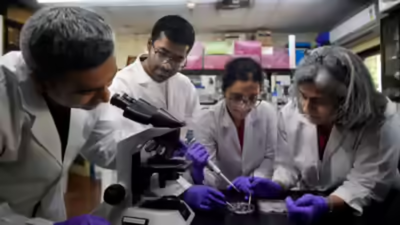Science
Tata Institute to Acquire Groundbreaking Laser Technology for Research

The Tata Institute of Fundamental Research (TIFR) in Hyderabad is poised to enhance its research capabilities through the acquisition of ultrashort pulse laser technology. This advanced laser system, which gained significant attention after the 2018 Nobel Prize in Physics was awarded for research involving its applications, has the ability to generate up to 10^15 watts of power. Once the technology is in place, TIFR will become only the second institution in India to utilize this cutting-edge system, following the Raja Ramanna Centre for Advanced Technology (RRCAT) in Indore.
According to Prashant Singh, a scientist specializing in Laser Physics at TIFR, the scale of power produced by this technology is staggering. “Imagine a light bulb in your home emitting light, and then envision that light and intensity increasing by one quadrillion times; that’s how much power this technology can generate,” he explained. The implications of this acquisition extend well beyond TIFR’s existing research boundaries, opening new avenues in fields such as astrophysics and particle physics.
Expanding Research Frontiers
The ultrashort pulse laser technology has the potential to ionize any element on Earth, a feat unmatched by other scientific instruments. This capacity will allow TIFR researchers to delve deeper into areas previously constrained by technological limitations. “With this technology, we can now explore astrophysics and particle physics in detail, areas where our research has so far been limited,” Singh noted.
In addition to its applications in fundamental research, this laser technology holds promise for transformative advancements in various fields, including medicine. Singh highlighted the potential benefits for cancer treatment: “The laser technology used in chemotherapy and radiotherapy currently takes time to target cancer cells and often affects surrounding healthy cells, leading to side effects. With this new laser technology, cancer treatment will not only become quicker, but it will also be able to reach the cells with greater precision.”
Anticipated Arrival and Future Impact
The equipment is expected to arrive at TIFR in early 2026, marking a significant milestone for the institute and the broader scientific community in India. Scientists believe that this acquisition will not only enhance TIFR’s research capacity but also foster collaboration among various scientific disciplines, propelling India further into the global research arena.
As TIFR prepares for this acquisition, the institute anticipates that the ultrashort pulse laser technology will serve as a catalyst for innovation and discovery, paving the way for breakthroughs that could redefine our understanding of both the universe and the human body.
-

 World5 months ago
World5 months agoSBI Announces QIP Floor Price at ₹811.05 Per Share
-

 Lifestyle5 months ago
Lifestyle5 months agoCept Unveils ₹3.1 Crore Urban Mobility Plan for Sustainable Growth
-

 Science4 months ago
Science4 months agoNew Blood Group Discovered in South Indian Woman at Rotary Centre
-

 World5 months ago
World5 months agoTorrential Rains Cause Flash Flooding in New York and New Jersey
-

 Top Stories5 months ago
Top Stories5 months agoKonkani Cultural Organisation to Host Pearl Jubilee in Abu Dhabi
-

 Sports4 months ago
Sports4 months agoBroad Advocates for Bowling Change Ahead of Final Test Against India
-

 Science5 months ago
Science5 months agoNothing Headphone 1 Review: A Bold Contender in Audio Design
-

 Top Stories5 months ago
Top Stories5 months agoAir India Crash Investigation Highlights Boeing Fuel Switch Concerns
-

 Business5 months ago
Business5 months agoIndian Stock Market Rebounds: Sensex and Nifty Rise After Four-Day Decline
-

 Sports4 months ago
Sports4 months agoCristian Totti Retires at 19: Pressure of Fame Takes Toll
-

 Politics5 months ago
Politics5 months agoAbandoned Doberman Finds New Home After Journey to Prague
-

 Top Stories5 months ago
Top Stories5 months agoPatna Bank Manager Abhishek Varun Found Dead in Well









